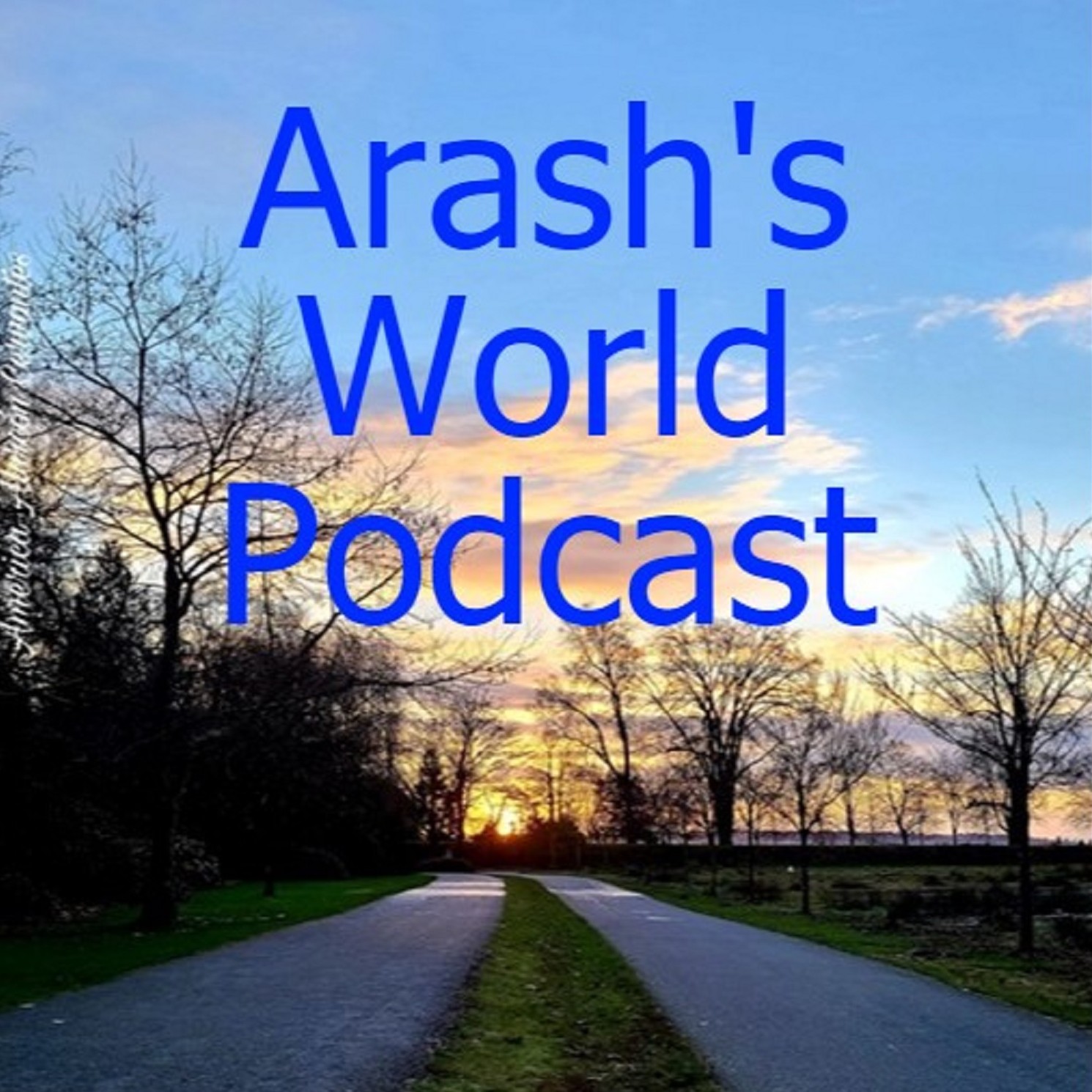
6K
Downloads
177
Episodes
This podcast is affiliated with the blog Arash's World dealing with existential issues and solutions in health and wellness, psychology, and philosophy. By providing reviews on books alongside exclusive, insightful & thought-provoking interviews with health & wellness experts, renowned psychologists & psychotherapists as well as global thought leaders and life coaches, we put together and forge individual holistic paths toward health, happiness, and wellbeing in your personal & professional life!
Episodes
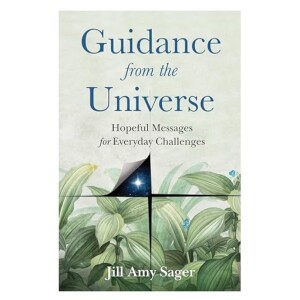
Sunday Mar 09, 2025
Sunday Mar 09, 2025
In this episode, I have the great pleasure of speaking with Jill Amy Sager, Tarot Reader, channeler, and author of “Guidance from the Universe: Hopeful Messages for Everyday Challenges” about reading Tarot, channeling and receiving messages from the universe and the importance of intuition and hope in our everyday lives.
Jill has been a life-long Tarot card reader, and she has seen the effects of the oracle not only in her own personal life but also how it has helped many of her clients deal with difficult situations and decisions. That has also strengthened her relationship with the universe and being able to channel, perceive and recognize signs and signposts in nature and our surroundings.
Being open, aware, and mindful of ourselves and our surroundings has been helpful, but it has also been a source of hope while also building resilience within. Despite various limitations and obstacles in her life, she has not only managed to overcome them but also thrive. With her work and her book, she is sharing her personal insights and experiences without being academic or having a religious dogma or agenda attached to them but as a means of connecting to our own guidance available to each one of us.
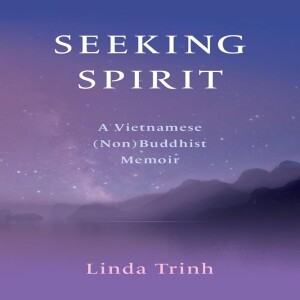
Saturday Feb 15, 2025
Saturday Feb 15, 2025
In this episode, I have the great pleasure of speaking with Linda Trinh, Vietnamese Canadian author of “Seeking Spirit: A Vietnamese (Non) Buddhist Memoir” on the role and influence of spirituality in her personal life. Linda discusses some of the difficulties and challenges of forging her own identity while juggling her Vietnamese culture with its rituals and traditions and the Canadian culture of her upbringing in addition to her global travels and her own unique beliefs, thoughts, and impressions.
When faced with trauma, Linda finds both recourse and solace in her spiritual beliefs and the belief in an afterlife. We also talk about how it is important to accept life and suffering and that many of us experience a lack in our lives that could be filled with beliefs in the spirit and the continuous practice of spirituality.

Saturday Feb 08, 2025
Saturday Feb 08, 2025
In this episode, I have the great pleasure of speaking with Sherianna Boyle, founder of Emotional Detox Coaching and author of Just Ask Spirit: Free your Emotions to Energize Intuition and Discover Purpose on the intimate links and connections between emotions, intuition, and spirituality.
We discuss how emotions are important and vital to our existence and that we should not evade, numb or disregard them but rather to feel them first so that we can process them later; this can help us find balance and spiritual alignment. While following the seven-step mindful process of Sherianna’s Cleanse Method, we can both process our emotions and connect with Spirit.
Moreover, Sherianna explains how we can manifest by asking and by raising our frequency and vibration. The signs and signals are out there and when we are mindful and raise our awareness, we can perceive them and find help, guidance, and support along the way. By aligning ourselves spiritually, we gain access to this spiritual force, and in the process, we enhance our intuition, grow spiritually, attain the innate wisdom of our soul, and discover and find our true purpose and calling in life.
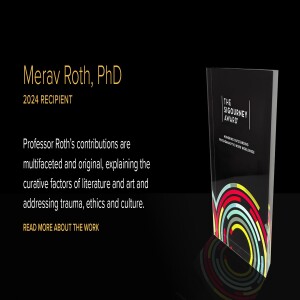
Sunday Jan 19, 2025
Sunday Jan 19, 2025
In this episode, I have the great pleasure of speaking with Dr. Merav Roth, a recent Sigourney Award Recipient for her work as a psychoanalyst and cultural researcher aiding and supporting trauma survivors and bereaved families while also contributing to the field of literature by examining it through a fascinating and insightful psychoanalytic lens.
We discuss both conscious and unconscious processes that occur when facing and responding to severe trauma, suffering, and extreme loss as has been the tragic and heartbreaking reality after the October 7th massacre, the taking of hostages, and the Gaza War. Dr. Roth provides various examples from her own work and experience dealing with such horrendous and devastating cases and situations.
Moreover, we discuss how the arts, poetry, and literature have the potential and the power to inspire and transform us in different ways; at the same time, psychoanalysis is more than a tool and a technique to uncover and bring up hidden thoughts and unwanted emotions as it can pave the way for self-discovery, growth, and healing.
When reading a book, both the conscious and the unconscious mind of the reader is engaging and interacting with both conscious and unconscious processes and aspects of the writer resulting in a type of meeting of unconscious minds.
As a result, the arts can change and transform us, can give us hope and help us reconnect with the beauty of the world, but ultimately, it is love that is the ultimate cure to help us process and deal with the pain, loss, and suffering that we face and encounter in life.

Saturday Jan 18, 2025
Saturday Jan 18, 2025
In this episode, I have the great pleasure of talking to Letao Wang who specializes in Chinese and Western astrology, mythology, Tarot Cards and who is also the founder of The Healing Kingdom where he provides a wide range of counselling services. He also created two oracles with beautiful decks and guidebooks: The Oracle of the Mythic Heroes and The Oracle of the Celestial Deities.
With the Chinese New Year of the Wood Snake approaching, I took the opportunity to ask him about his projections and predictions regarding opportunities and potential challenges in the coming year. As he explains, there will be a significant shift from Dragon yang energy associated with authority and power to a more receptive period with the wise and intuitive Snake representing yin energy. Moreover, it will be a time for shedding the old skin but also finding and connecting with one’s roots and foundations.
We also discuss the similarities and differences between Eastern and Western approaches and Letao explains how they are complementary and can be combined to present a fuller picture. In fact, the mental health field would greatly benefit from incorporating and integrating spirituality to make its paradigm more holistic.
Finally, we talk about synchronicity and serendipity as well as how we can have a sense of destiny and fate by also allowing room for free will and personal agency. We cannot merely blame the stars for our conditions and situations but need to take personal responsibility and not be driven by a false sense of justice where we feel we have been wronged or that the world is unfair or biased against us.
As Letao explains we are seeds that contain many possibilities and potentialities within and although we do not choose the seed, we can take care of it, cultivate it, and make it bloom and flourish.

Wednesday Jan 15, 2025
Molly Peacock’s Widow’s Crayon Box: Poetry to Transcend Grief and Add Color to Life
Wednesday Jan 15, 2025
Wednesday Jan 15, 2025
In this episode, I have the great pleasure of speaking to Poet and Biographer Molly Peacock on the different states of widowhood, alongside themes of sickness and disease, nursing and caregiving, and loss expressed honestly, candidly, playfully, and colorfully in her poetry book The Widow’s Crayon Box.
We discuss thinking outside of the (crayon) box and looking beyond traditional forms of grief and grieving by adding a celebration of life with an enhanced and enriched experience of life after loss and how it is possible to hold and experience two different emotions like joy and grief at the same time. But Molly also explains openly and candidly the various states and mixed emotions and ups and downs of providing care to a loved one requiring a wide array of colors from the crayon box.
Moreover, Molly reads three of her poems from The Widow’s Crayon Box - “Touched”, “Sex after Seventy”, and “Honey Crisp” - followed by a brief discussion on them including that it is never too late to have and enjoy sex alongside the many pleasures of life. We also discuss some of her other work and projects, which include biographies, a memoir, a one-woman-show as well as her inspiring “Secret Poetry Room” Project.
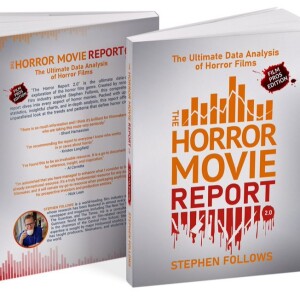
Tuesday Oct 22, 2024
Tuesday Oct 22, 2024
In this episode, I have the great pleasure of speaking with film industry data researcher and movie producer Stephen Follows about “The Horror Movie Report,” which covers and uncovers cultural fears, how anxieties have shifted over time, and how all of this is portrayed and reflected in the horror movie genre.
As these films tend to operate on a much lower budget with less oversight and restrictions, they end up not only increasing artistic freedom of speech and expression, but they can also dive in more freely into topics, subjects, and themes that are often off-limits and taboo in mainstream cinema.
At the same time, these movies also give us insight into and feedback upon the make-up and psychology of the audience and what that can tell us about the interests and anxieties of any given period. For instance, this is also reflected in changing victim demographics as well as how and why serial killer movies peaked in a particular decade.
Culturally, there is also a shift from fear of communism and nuclear war as evidenced in Godzilla and zombie movies and The Invasion of the Body Snatchers to slasher and found footage films and horror films on epidemics and pandemics. In many ways, this data and the correlations give us important and relevant glimpses and insights into the psyche, the mindset, and the culture of any given time period.
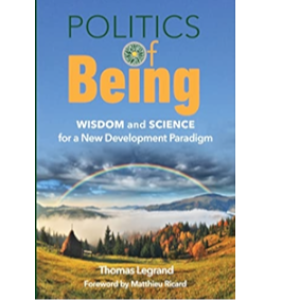
Saturday Oct 19, 2024
Saturday Oct 19, 2024
In this episode, I have the great pleasure of speaking with Social Scientist and Sustainability Practitioner Thomas Legrand, author of “Politics of Being: Wisdom and Science for a New Development Paradigm” who is also involved with the UN initiative of Conscious Food Systems Alliance.
We discuss the importance and necessity of biodiversity both in our natural and social world and how each person ought to be provided with the opportunities, resources, tools, education, and support to reach their full potential. By changing our definition and understanding of economic growth and switching the bottom line from a “having” to a “being” mode, everyone could benefit in the process.
Moreover, it is also vital to change our view and outlook on mental health in general. Currently, there is too much focus on issues and problems but a more positive approach in the lines of positive psychology and positive psychiatry could aim at boosting each and everyone’s wellbeing level.
That said, it is still important to consider and look at the influence of individual and collective trauma and how healing could not only help us connect with ourselves and others on an authentic and much deeper level but also motivate us to take positive action and increase pro-social and pro-environmental values and behaviours.
We are on the cusp of a vital transformational wave and by emphasizing being and spirituality and our connection with other human beings and our natural habitat, we can not only face and overcome the upcoming challenges and crises but use them as an opportunity to build a better, more hopeful and joyful world for ourselves, our children, and al the subsequent generations to come.
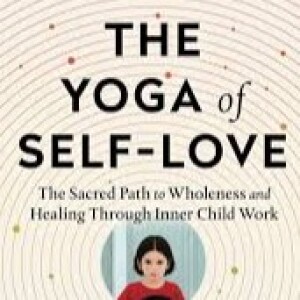
Wednesday Sep 25, 2024
Seeing Love and Shining Brightly with Ramaa Krishnan’s Yoga of Self-Love
Wednesday Sep 25, 2024
Wednesday Sep 25, 2024
In this episode, I have the great pleasure of speaking with Ramaa Krishnan, founder of “Full Bloomed Lotus Center for Self-Awareness” and author of “The Yoga of Self-Love: The Sacred Path to Wholeness and Healing through Inner-Child Work” on the different phases and aspects of healing and of loving ourselves in healthy ways and manners.
First off, we need to discover ourselves and truly see and connect with our essence and only then can we practice self-love, which is much more and much deeper than appreciating our strengths but rather accepting, embracing, and loving the entire package that is who we really are.
This is a life-long practice and both mindfulness and self-awareness are essential and vital for this. In that sense, love is not so much feeling but rather seeing ourselves and fostering and developing qualities that we have ignored or neglected in our lives. For this to occur, it is important to engage in inner child work.
This also entails facing difficult moments and addressing traumas of the past so that we can come out feeling better about ourselves and liberating ourselves from accumulated shame, blame, and guilt. As such, we can live a much happier life with stronger will, more intention, more trust, and one that opens up and is filled with self-love and love for all beings around us.
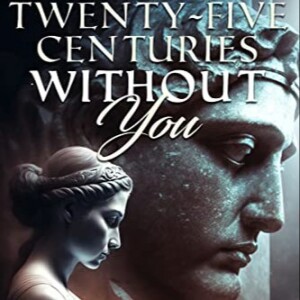
Sunday Sep 01, 2024
Sunday Sep 01, 2024
In this fascinating and enlightening episode, I have the great pleasure of speaking to Dr. Viktória Duda, Consciousness Researcher, Writer, Hypnotherapist, and Author of the book “Twenty-Five Centuries Without You” on consciousness and past lives.
As she explains, consciousness is the fundamental creative principle of life that is within and working through each individual sentient being. By studying and better understanding consciousness, we would not only overcome our fear of death but could also improve our own lives.
Each life can be perceived as a story with elements and themes often connected through what Stan Grof calls condensed experiences, which can help us resolve issues and problems in a given life, and in that process, we would elevate our own consciousness and the world around us.
Once we elevate our vibrations and frequencies and move away from the narrow and limited paradigm of materialism, we will find ourselves more in alignment with our true self and surroundings imbued with an overall sense of joy and happiness. In this higher state of consciousness, challenges are not seen as stumbling blocks but as temporary hurdles that can lead us to personal growth, resilience, and better outcomes for everyone involved.
